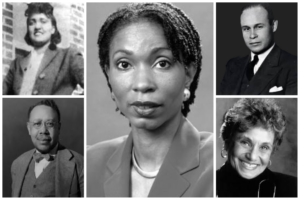Five Influential Black Americans Who Helped Shape Global Health
By Anderson Alleyne, Communications Consultant, Global Health Council

Throughout the years, Global Health Council has been lifting up Black voices in global health— most recently through the Black Voices YouTube Series, the 2020 virtual summit, and the Racial Justice in Global Health page—and will continue to do so. In honor of Black History Month, GHC recognizes the achievements of five champions in the field. These men and women have broken barriers and improved the health and well-being of people worldwide. Here is a small fraction of the many Black American heroes and their invaluable contributions in the health space.
Henrietta Lacks
Henrietta Lacks was 30 years old when she was diagnosed with cervical cancer in 1951. While receiving treatment at John Hopkins University, a doctor took a tissue sample of her cells and sent it to a lab without her consent. Henrietta’s cells were discovered to grow indefinitely and became the first immortal human cells ever grown in culture. Known as the HeLa cell line, her cells were essential to developing the polio vaccine, COVID-19 research, cloning, gene mapping, in vitro fertilization, and more. Lack’s family did not learn of the cell cultures until 25 years after her death.
William Hinton
William Hinton was a public health innovator and the first Black professor at Harvard University. A bacteriologist and pathologist, he developed a new serological test for syphilis, known as the Hinton test. Due to its accuracy, the test was adopted nationally by the United States Public Health Service and his discovery allowed doctors to detect and treat the disease in its early stages. His research was later compiled into a textbook, Syphilis and its Treatment, which was the first medical textbook authored by an African-American.
Helene D. Gayle
Helene D. Gayle is a doctor and CEO of The Chicago Community Trust, one of the nation’s leading community foundations. Previously, Dr. Gayle was CEO of McKinsey Social Initiative as well as CARE USA, a leading international humanitarian organization. An expert in global development and health issues, Dr. Gayle spent 20 years with the Centers for Disease Control to further programs on HIV/AIDS in addition to directing programs on HIV, TB, and reproductive health at the Bill & Melinda Gates Foundation. She also has been named one of Forbes’ “100 Most Powerful Women,” Foreign Policy magazine’s “Top 100 Global Thinkers,” and Newsweek’s top 10 “Women in Leadership.”
Charles Richard Drew
Dr. Charles Drew was a pioneering African American medical researcher and one of the most important scientists of the 20th century. He discovered a method for long-term storage of blood plasma during World War II which saved thousands of lives. Known as “the father of the blood bank,” Drew’s innovative mobile blood donation concept was adapted by the American Red Cross and he was appointed director of the organization’s first blood bank in 1941. He later resigned from his position and protested against the racial segregation in the donation of blood.
Marilyn Hughes Gaston
Marilyn Hughes Gaston has dedicated her career to improving the health of poor and minority families in the U.S. and abroad. She is the first African American woman to direct a Public Health Service Bureau and the second African American woman to achieve the position of Assistant Surgeon General and rank of Rear Admiral in the US Public Health Service. Additionally, Dr. Gaston’s research of sickle-cell disease led to a nationwide screening program to test newborns for immediate treatment which resulted in a significant reduction of morbidity and mortality in young children around the world.